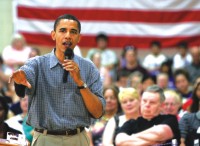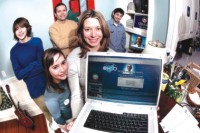|
Perspective
A Clever Little Strategy
How the Internet has changed election campaigning in US politics
Sharier Khan, back from USA
 So how did a lesser-known black US politician like Barack Obama become such a political phenomenon? If it was merely the unpopularity of the Bush government, should Hillary Clinton not be spearheading the Democrat campaign? How did Obama beat a seasoned politician like Hillary? So how did a lesser-known black US politician like Barack Obama become such a political phenomenon? If it was merely the unpopularity of the Bush government, should Hillary Clinton not be spearheading the Democrat campaign? How did Obama beat a seasoned politician like Hillary?
According to Kevin Lampe, one of the important campaign volunteers of Obama, he utilised the Internet to involve small fund contributors across America. Through these contributions, about two million small donors --with whom Obama maintains Internet networking--have themselves become Obama's biggest campaigners. On an average each of these two million have donated 60 dollars per head for Obama.
On the other hand, Hillary and Obama's Republican opponent McCain resorted to a more traditional approach. In their election campaign Republicans mainly depend on influential fund-raisers known as "bundlers" who play a crucial role in both fund raising and involving people in the campaign.
 |
Obama supporters.
Photo: www.wired.com |
Bundlers are persons who gather political donations from different individuals and present the sum to the campaign of a particular candidate. This is particularly important because the US Federal Law prohibits individual donations of more than US 2300 dollars for a campaign. In the present US political context, a presidential candidate needs hundreds of millions of dollars for campaigning, which include TV commercials and personal appearances in different states. Bundlers help a candidate raise her/his funds pretty quickly and efficiently.
"Money is the mother's milk in US politics," said Kevin Lampe at a meeting with about 20 international visitors organised by the Department of State, at Chicago, explaining how election funding influences the campaign. Lampe has been working for the Democrats for two decades.
"Hillary used rich contributors. But Obama sought smaller donors through the internet," he said terming the use of the Internet as the next biggest thing to happen in the election campaign since the use of TV was introduced for the first time.
An important figure in the Obama campaigns for the State Senate of Illinois and for the U.S. Senate, Lampe explains, "Normally it costs a lot to get smaller donations. It might cost you 50 dollars to get 10 dollars (if you use traditional mailing and communication system). But with the Internet, a few clicks can help send out millions of mails requesting donations without any cost. And with a few clicks individuals can donate a sum as small as 5 dollars or above."
To attract such small donors-- whom candidates had never tapped in the past-- Obama had announced that 16 of the donors can have lunch with Obama.
"Because of this small sum, donors do not feel pressed," he adds.
In addition to this easy donation system, the Internet also gave the donors a lot of things to do. Traditionally volunteers did not have many things to do. "The people who put money in Obama's campaign got involved in asking other people to join them. People are riding buses and travelling distances just for the purpose of campaigning. They are very excited," Lampe notes.
"Door to door campaign is important and a successful candidate needs people in the field to speak for him," he adds.
Obama's rival McCain's campaign is under-funded and based mainly on TV commercials. McCain's scheduling is so hectic that he does not get enough rest-- he appears tired, says Lampe. Obama on the other hand can physically take the campaign.
Lampe notes that the questions of oil price and jobs would strongly influence the election outcomes. It will be followed by the personality of the candidates.
He believes that the US was ready for a black president and Obama will be the winner, "The Obama camp is very organised and the campaign is based on simple and easy messages."
Copyright (R) thedailystar.net 2008 |
